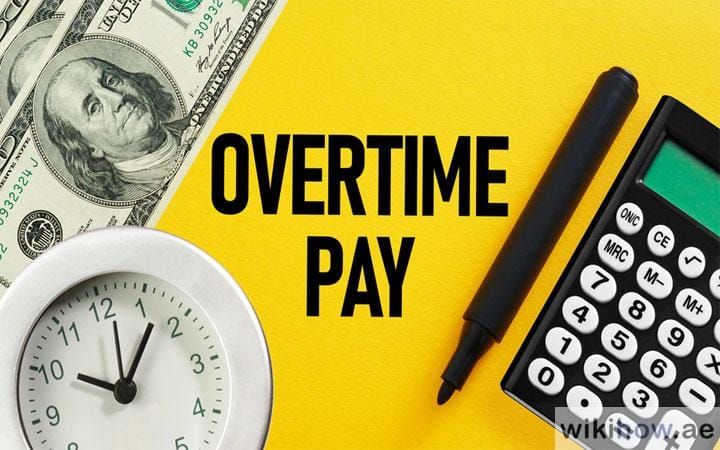UAE Overtime Rules Explained: How Overtime Pay Is Calculated

The United Arab Emirates (UAE) strictly regulates payment of overtime to safeguard employees’ rights and offer justifiable remuneration for work in excess of a standard working schedule. The government seeks to prevent exploitation, improve work-life balance and grant employees justifiable remuneration for their work. Overtime applies in the majority of private sector employees, including maximum working time, overtime compensation, and employer obligations. Knowledge of these laws ensures that employers and employees can have an open and legally sound working environment.
Quick review of the article’s key points:
- The UAE strictly regulates overtime to protect employee rights and fair pay.
- Standard working hours are 8 hours per day and 48 hours per week.
- Regular overtime is paid at 125% of the hourly wage.
- Night work and public holiday overtime are paid at 150%.
- Work between 10:00 PM and 4:00 AM qualifies as night overtime.
- Senior managers and supervisory roles are exempt from overtime pay.
- Working hours are reduced by 2 hours per day during Ramadan.
- Employers must accurately record all working and overtime hours.
Overview of UAE Overtime Law (2026 Update):
The UAE Overtime Law in 2026 outlines clear regulations designed to ensure fair compensation and healthy work conditions for employees across both public and private sectors. According to the revised regulations, workers who put in more time than the typical 8-hour workday or 48-hour workweek are eligible for overtime compensation, which is normally computed at 125% for additional hours and 150% for late-night or holiday work. The law also emphasizes limits on total overtime hours, requiring employers to maintain accurate records and guarantee that additional work is performed only when necessary. These updates reinforce the UAE’s commitment to protecting workers’ rights while supporting transparent and ethical employment practices.

Weekly Limits and Standard Working Hours
Standard working hours are set at eight hours per day and forty-eight hours per week in accordance with UAE labor regulations, guaranteeing employees a balanced and manageable workload. Certain industries, such as hospitality and retail, may have flexible schedules, but employers must still comply with weekly limits and provide proper breaks. The updated framework emphasizes employee well-being, requiring companies to avoid excessive workloads unless overtime is formally approved and accurately recorded. These regulations aid in preserving openness and shielding employees from unjust or prolonged working conditions. For household staff and caregivers, the rules may differ slightly under the Domestic Workers Law in UAE, which outlines separate provisions for working hours and rest periods.
Who Is Exempt from Overtime Pay?
According to UAE labor law, certain types of workers, mostly those in managerial or supervisory roles, are not entitled to overtime compensation. Individuals who hold decision-making authority, oversee teams, or have significant control over operations are typically not entitled to overtime compensation. This exemption also applies to roles where the nature of the job requires flexibility in working hours, often tied to higher responsibility and strategic duties. The law emphasizes how crucial it is to provide precise job descriptions so that both employers and employees are aware of whether a position is exempt from overtime.
Legal Framework Controlling Overtime in UAE
UAE overtime rules are primarily regulated by Federal Decree-Law No. 33 of 2021 regarding the Regulation of Labour Relations. The aforementioned law will apply to all private sector employees in the UAE, apart from free zone employees like DIFC and ADGM, which both have their own labor laws.

Who Qualifies for Overtime Pay?
Not all employees are eligible for overtime pay. Eligibility depends on the nature of the work and labor contracts.
- Eligible employees for overtime pay: The Majority of private sector workers
- Exempted employees: High-level executives, managerial staff, and fieldwork professionals where worktime is not predetermined
Standard Working Hours in UAE
The UAE labor law has stringent provisions for standard working hours to treat workers in a fair and equitable manner while promoting productivity. These regulations apply to most private-sector workers with special provisions for different sectors.
- The standard working hours in the UAE are 8 hours a day or 48 hours a week.
- During Ramadan time, working hours are reduced by 2 hours a day.
Overtime Calculation in UAE
Overtime pay is calculated based on basic pay and also on when the extra hours are worked.
- Normal Overtime: Employees who work over regular hours are paid 125% of their hourly wage.
- Night Shift Overtime: Working hours between the periods of 10:00 PM and 4:00 AM are paid at 150% of the hourly wage.
- Public Holiday Overtime: Employees working on gazetted holidays receive 150% of their hourly wage.

Official Overtime Formula
The UAE labor law uses a straightforward formula to calculate overtime: Overtime Pay = (Basic Hourly Wage × Overtime Rate) × Number of Overtime Hours. For instance, the computation becomes AED 20 × 1.25 × 2 = AED 50 if an employee earns AED 20 per hour and works two additional hours during a regular workday at a 25% overtime rate. For late-night work at a 50% rate, the same employee would earn AED 20 × 1.5 × 2 = AED 60. This formula helps employees and employers accurately determine fair compensation in all overtime scenarios.
Overtime Pay Rates Under UAE Law
Overtime pay in the UAE also varies depending on when overtime is done. Employees who work additional hours over and above regular working hours are better remunerated, with an additional premium being paid for night work and public holidays under labor legislation.
| Type of Overtime | Rate |
| Regular Overtime | 125% of hourly wage |
| Night Shift Overtime (10 PM – 4 AM) | 150% of hourly wage |
| Overtime on Public Holidays | 150% of hourly wage |
Night Shift Overtime
Due to the nature of late-night work, night shift overtime in the United Arab Emirates carries a higher overtime rate and applies to any work completed between 10 PM and 4 AM. Unless their job requires night shifts as a regular duty, employees who work during these hours are typically entitled to 150% of their basic hourly wage. The rule aims to protect workers’ health and well-being by recognizing the impact of nighttime work on rest and productivity and is closely aligned with the principles outlined in the Health and safety laws for workers in UAE. Employers must clearly document night shift hours to ensure compliance with the law.
Weekly Rest Day, Overtime, and Public Holiday
Employees are entitled to increased overtime pay if they are forced to work on public holidays or their weekly rest day. Typically, this includes a 150% overtime rate or compensatory time off, depending on company policy and the employee’s contract. These rules are designed to protect employees’ rights to rest and ensure fair treatment when work is required during important national or religious holidays. Schedules must be communicated beforehand, and employers must accurately document any overtime related to holidays.
Overtime for Different Industries
Overtime policy for the UAE varies for the private and government sectors. Private sector employees are under the UAE labor laws, which entail overtime pay for extra working hours. Public sector employees have other provisions based on government policies, which may involve other types of compensation like extra leave instead of extra payment. Employers and employees should refer to their contracts for sector-based overtime policy.

Overtime and Remote Work in UAE
Remote workers can qualify for overtime if they work more than standard working hours, but only with the permission of the employer. Employers are required to monitor remote working hours through digital platforms to ascertain compliance. Flexible working arrangements could influence overtime eligibility, and hence employees need to check their contracts. In case overtime is unfairly denied, they can lodge a complaint with MOHRE for determination.
Penalties for Employers Violating Overtime Laws
Employers who violate the UAE overtime law can be fined heavily by the Ministry of Human Resources and Emiratisation (MOHRE) and may face potential court action by employees for unpaid wages. Repeated non-compliance could lead to business restrictions, suspension of activity, or cancellation of the license. Employers can avoid fines by adhering to labor legislation, maintaining accurate records, and paying reasonable compensation for overtime.
Overtime Rules for UAE Free Zones
Overtime regulations will thus differ from the Federal UAE Labor Law, since areas such as the Dubai International Financial Centre and the Abu Dhabi Global Market have their own free zone employment laws. Such free zones may have different definitions of eligibility for overtime, overtime rates, and limits on working hours, with many requirements contained directly in the employment contract. Although some free zones closely follow federal rules, others offer highly flexible policies, particularly for managerial and professional employees. Employees should always check the regulations for their specific free zone to determine how overtime is handled.

Employer Obligations and Compliance
Employers in the UAE must follow strict rules to make sure overtime practices are fair and transparent. They need to keep accurate records, get the right consent for extra work hours, and ensure all overtime payments are made on time. Companies must also set up systems to track working hours and prevent excessive workloads that could break legal limits. By upholding these responsibilities, the UAE seeks to protect workers’ rights while supporting ethical and well-regulated workplace operations.
Record-Keeping Requirements
UAE labor regulations require employers to keep detailed and accurate records of employees’ working hours, overtime, breaks, and payroll data. These records must be updated regularly and accessible for inspection by authorities, especially during compliance audits. Proper record-keeping protects employees and shields employers from legal disputes and penalties. Modern companies are increasingly using digital time-tracking systems to ensure transparency, accuracy, and full compliance with labor law standards.
Consent Requirements for Overtime
Overtime cannot be imposed randomly in the UAE. Employees must be informed and, in many cases, give their consent before working extra hours. While some business needs may necessitate overtime, employers must clearly communicate their expectations and ensure that employees agree to work beyond the standard limits. This requirement promotes fairness, prevents pressure, and helps employees maintain a reasonable work-life balance. It is often advisable to have written or documented consent to avoid misunderstandings and support legal compliance.
Payment Deadlines & Payroll Compliance
Employers are required by law to pay overtime wages in the same payroll cycle as regular salary payments. Missing these deadlines can lead to penalties, compliance issues, or problems with the wage protection system (WPS). Companies need to make sure that payroll calculations are correct and include all approved overtime hours. Meeting these deadlines not only fulfills legal obligations but also builds employer trust and credibility with employees.
Employer’s Role in Overtime Management
UAE employers are responsible for tracking and recording overtime hours, ensuring prompt payment of extra wages, and complying with UAE labor laws to avoid penalties. They must implement clearly defined policies, use effective attendance systems, and maintain transparent communication with employees regarding overtime eligibility and payment. Ineffective overtime management can lead to legal disputes and financial penalties, potentially affecting the employer-employee relationship. In extreme cases, persistent labor law violations can even contribute to Termination of Employment in UAE, emphasizing the importance of fair and lawful workplace practices.

Conclusion
UAE overtime legislation related to remuneration is designed to protect employees and ensure fair pay. Legal rules must be adhered to by employers, with workers anticipated to be well-informed about their rights and entitlements. Proper awareness of labor law will make the work environment fair and legal in the UAE.
For the latest updates on UAE labor laws and other news, visit WikiHow. They update regularly and would love to hear your thoughts and experiences in the comments!
FAQs
1. How much overtime can an employee work in a week?
The law restricts overtime to 2 additional hours per day, meaning no more than 10 hours per day.
2. Is overtime pay mandatory for all employees?
No, certain senior-level positions and managerial roles are exempt from overtime pay.
3. Can employers compensate overtime with extra leave instead of pay?
Yes, but only if the employee agrees to it in writing.
4. Can the employer force overtime?
No. An employer cannot force overtime without proper justification and clear communication. In most cases, the employee’s consent is required, except in urgent situations where business operations demand it.
5. Is travel time included in overtime?
Travel time is generally not counted as overtime unless the employee is traveling for work-related tasks during normal working hours or performing duties while traveling.





